An All-Female Band Lets Sweet Charity Grab Destiny by the Bass
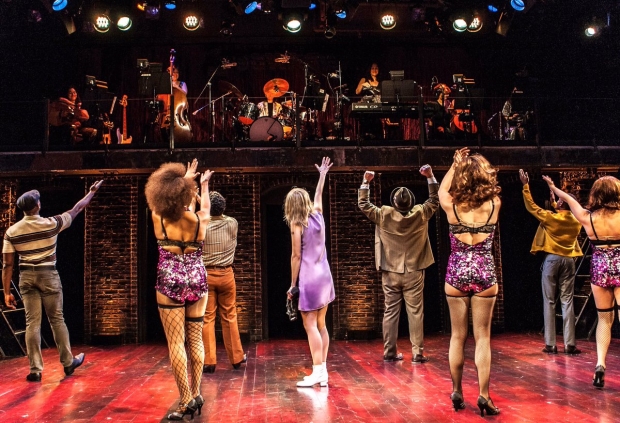
(© Monique Carboni)
"All right ladies, here we go! One, two, three, four!" calls music director Georgia Stitt to her five-woman band at curtain up for each performance of the New Group's Sweet Charity, starring Tony winner Sutton Foster. For patrons who somehow missed the orchestra as they march — glamorously costumed — to their perch above the stage, it's one final pre-performance "hey, check us out" declaration. These are women who know how to claim their space.
The choice to make Sweet Charity's all-female band a conspicuous part of the revival came from director Leigh Silverman. For her, the 1966 musical is a look into the head of its eponymous central character and, as Stitt relayed, "What's in her head is female, so why not have that be manifested by women?" Stitt and orchestrator Mary-Mitchell Campbell (who completes the show's all-female music team) "jumped on board" with the concept, but, said Stitt, "That's where things got challenging."
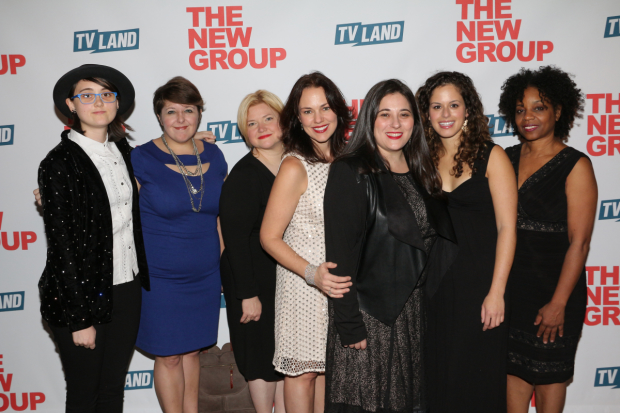
(© David Gordon)
Why is it not more common to see all-female bands in the theater?
Mary-Mitchell Campbell: My guess would be convenience, honestly. Without Leigh having mandated this as far as her vision for the show, I don't think we would have had an all-female band.
Georgia Stitt: It was much harder.
Mary-Mitchell: Because a lot of times you go for the easy answers and those are typically male. Just because they are the people who do it all the time.
What do you mean by that?
Georgia: We were heading into tech rehearsals without a guitarist. All of the guitarists that we had been looking at were unavailable. We had already been through our list.
But around the same time Elana had sent an e-mail to a contractor that we knew saying, "Hey, I'm interested in playing shows if anything comes up." And within an hour or so he forwarded the e-mail to us.
Elana Arian: I'd been doing freelance recording work for a long time and trying to break into shows. I found that it's a pretty tight world, like Mary-Mitchell and Georgia were saying. People are super cool and looking out for their friends and getting them on their sub list, but that makes it hard to find an opening.
Georgia: It's kind of a boys club.
Elana: It is a boys club. Before my daughter was born, I got close to getting in to some sub stuff and then after she was born, she's three, I kind of took a little rest. For Sweet Charity I went to bed one night and I woke up in the morning and I had an e-mail saying, can you come in for a ten o'clock rehearsal? And I was like, "Yes I can."
Georgia: That was the moment you got the job. You might not have known it yet.
Elana: I didn't know it but it was really exciting. I will say I've just experienced the other side, what you both have been talking about in the preproduction end in terms of guitarists. Now I'm working the show and I'm trying to find a sub for a couple days. I figure this is not going to be an issue. I have a million friends who play Broadway. And the same exact thing. Every single one of my male friends who play Broadway told me the same one [woman]. And I thought to myself, "This is some nuts old-school stuff." It's just totally blown my mind the level to which this is still going on.
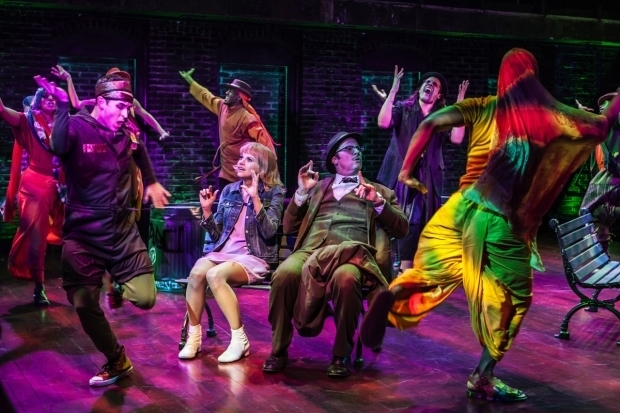
(© Monique Carboni)
Why is it so difficult to find women musicians?
Georgia: I think the bigger question is, why has it been harder for these women to get the experience?
Mary-Mitchell: My perception is it's experience-based as opposed to gender-based.
Georgia: If you've never had a chance to do it then when you walk into the room for the first time, that's where you are. But then you've done it. And then you do it again and you do it again. All of the women that we wound up hiring or that we contacted who weren't available have said some version of, "I was trying to break into shows, but I couldn't get in to that world." And we faced that too when we were coming up.
Mary-Mitchell: We did. But we always had each other.
Georgia: We've known each other for twenty years.
Mary-Mitchell: We met during college.
Georgia: In the early days we were very aware of being women in the business who did the same thing and very much had each other's back. It was like, "I can't do this job, but you should call Mary-Mitchell Campbell." Just to make sure that if I got an opportunity, she got one too, or vice versa. There's just something about the more women there are in the business, the more you see the other women. Once you get to the female musicians, they know other female musicians.
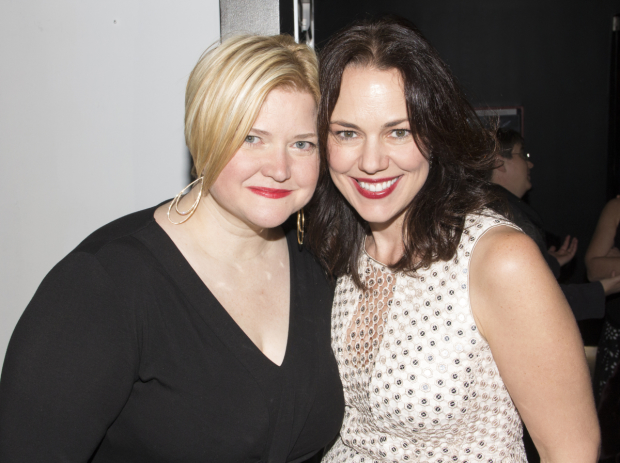
(© David Gordon)
What was it like when the band was finally all in the room together?
Georgia: At our first rehearsals, because we had a band full of people who didn't normally play shows, it took us a while to play confidently, for all six of us to say I own it, but we did. As Leigh said, "This show is about a woman who is trying to claim her own space — she's trying to be visible and she's trying to make a new destiny for herself." And so Leigh has challenged us as musicians to step into our own space and claim it.
Elana: At the sitzprobe, Georgia gave a little talk to the full band about the message of this show, encouraging everyone to take up their space, and I know for myself and it's very clear through the whole band, that has meant a tremendous amount. Because people are nervous, and I think that that underpinning of "it matters that you're who you are and we want you to do this" really has influenced everyone's commitment.
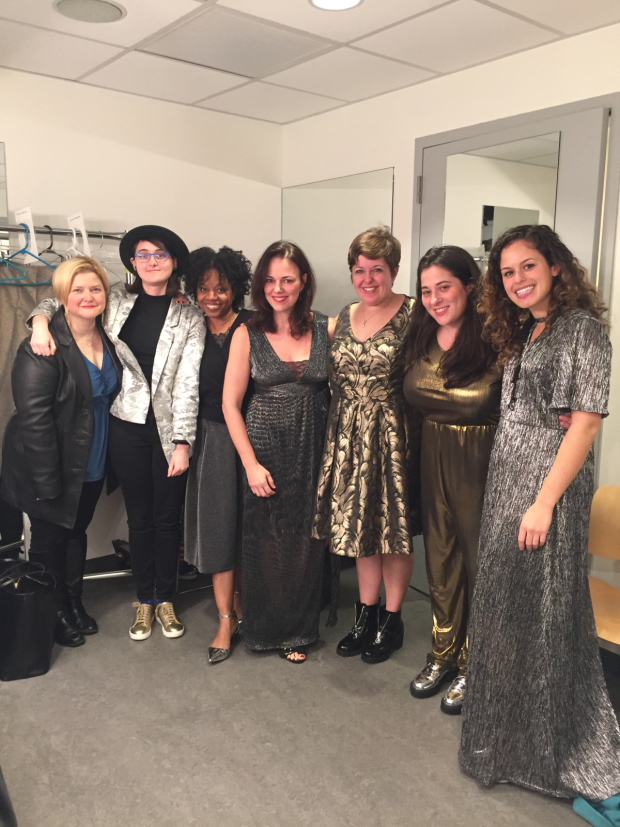
(© Nikka Graff Lanzarone)
Are there other ways Sweet Charity is moving the needle?
Georgia: I think there's a visibility. We're in costume, we're onstage, we're lit. If you're watching the show, you're aware that we're up there.
Elana: We have to physically walk past the audience, and I'm wearing like a gold jumpsuit, It's not subtle. So I think people are aware of us because we enter and we exit that way. People say like, "Wow, you ladies are kicking ass" or "You're rockin'," and people take pictures. There is a novelty there.
Georgia: Mary-Mitchell and I have both had experiences where we're conducting shows or playing for shows and somebody in the audience will be like, "Oh my god, I've never seen a lady conductor before."
Mary-Mitchell: Almost every show I've ever conducted, at almost every performance, somebody in the audience says something to me about that.
Georgia: That's why I think the visibility is important. In this show that is part of what we're doing. We're not just playing well, but we're being present in a way that we can be seen. So that people are having the conversations about it. And really, it's not revolutionary. You're not going to walk out of there and be like, "The band sounded so different because women are playing those instruments." It's more, "Huh, I don't think I've ever seen that before."
My fingers-crossed dream is that some headline somewhere says, "That all-girl band sure does have balls."












